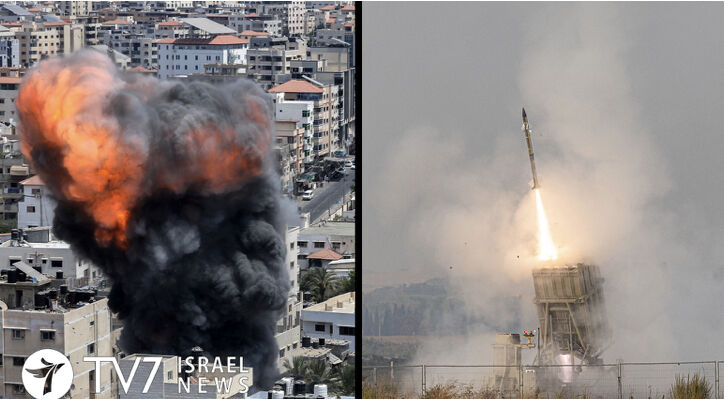Call It Pretaliation
By Amir Oren
“War” is not the right word for it. Even “Campaign” is too much for a 54-hour exchange of bombs, rockets and shells across a border, with one of the parties mercifully suffering zero fatalities. As for “Weekend”, it’s about right. Whoever left for vacation on Friday evening and tuned in only early Monday may have been surprised to find out that during that time the Israel Defense Forces and Palestinian Islamic Jihad fought each other in the worst flare-up over Gaza since May 2022.
The match-up was not equitable. In this corner, the mighty IDF, with its full array of weapon systems and highly competent commanders and operators. In the other one, a rag-tag band of Iranian-backed militants whose claim to fame is being even less amenable to co-existence with Israel than Hamas ruling Gaza and able to Harass Israel rather than get rid of it.
Yet Jihad seemed to have found Israel’s weak point – it is extremely casualty averse. The long-held policy of risk management, whereby a vague warning, that civilian vehicles driving along the border could be hit by anti-tank weapons launched from five kilometres inside the Gaza trip, only served to heighten motorists alert level, was abandoned. No longer was it deemed reasobable to go on with life until someone not careful enough was hit. The idea of even a single victim became unbearable to the Israeli public. Officials were condemned by bereaved relatives and opposition politicians for the sin of being in a position of authority when their loved one, or even a stranger, died on the line of duty or in a moment of carelessness.
The upshot was that when being threatened by a terror group, because of some grievance, Israel had two bad options – either to pre-empt or to halt all regular activity in the area at risk. It would be hard pressed to justify the former, to the world and even to its own population if the exchange of blows then led to Israeli fatalities. But if it shut down an entire region out of an abundance of caution, it would appear to have surrendered its sovereignty, and soon enough the residents, rather than being grateful for this life-saving measure, would become resentful at being under curfew.
The same scenario could be played out even without a threat, simply as a result of Israel’s highly effective intelligence sensors picking up credible indications of an act of terror in the works. If the perpetrators are smart, they may even chat about such an attack without actually preparing it, as the effect could be identical – defensive measures on the Israeli side.
Smart, indeed, but possibly too clever by half, because the credibility of Israeli intelligence, accepted by American and other Western services and their political masters, would help the Israeli government make the case for intercepting a squad on its way to launch the attack.
In summing up Operation Breaking Dawn (with Murphy apparently on vacation, so there was no hitch and no snickering about Breaking Down), Defense Minister Benny Gantz stated that “as necessary”, the IDF will again undertake “a preventive strike”. The terms are ambiguous. He may have meant a sortie to take out rocket squads as they were about to launch, or a raiding party inside a tunnel, but then again it can be interpreted as referring to a campaign initiated against the build-up of hostile forces, especially those armed with weapons of mass destruction or on their threshold. Gantz specifically mentioned Tehran as one of the addresses for this declaration – doctrine is perhaps too blown-up a title for it, yet.
Military observers are sure to caution themselves and their audiences that what transpired over a couple of days in one small corner of the Middle East is too small a sample from which to jump to sweeping conclusions. Nevertheless, some points stand out:
- Israeli intelligence of all sources and disciplines is unsurpassed. When the IDF withdrew from Gaza in 2005, Human Intelligence suffered, as Case Officers could no longer meet their assets face-to-face. One consequence was the failure to prevent the Gilad Shalit abduction in 2006. There were also other gaps in Israel’s information about the Hamas tunnels, as recently as eight years ago. This seems to gave been rectified.
- The mechanisms by which the IDF operates both on the General Staff level (Operations Division, Military Intelligence – itself enmeshed with Shabak, in charge of the Palestinian domain – and Air Force) and in the Southern Command/Gaza Division tactical HQ are uniquely suited to the advantages each component brings to bear.
- Avoiding non-combatant/collateral damage is a priority strictly supervised and followed.
- Fire dominates, manoeuvr waits. No armor or infantry is to be sent into terror traps as long as missiles, shells and bombs will do.
- Hope for a short campaign, act as if it may linger. As soon as the Israel Air Force struck its first targets, thousands of reserve servicemen were issued emergency call-up orders. This was both a readyness measure and a signal of seriousness. In the event, they were hardly needed, but it would have saved planners precious time if Murphy insisted on showing up on either side of the border.
So, strategic prevention or tactical pre-emption? Perhaps the right term would be a mixture of both, “Pretaliation” – an act of retaliation for an imminent attack, but carried out beforehand.
With less than five months to go before his term is up, IDF Chief Aviv Kochavi has probably met his last major challenge and came out with an excellent report card, albeit not against the mightiest of enemies. Considering that oftentimes the difference between success and failure is whisker-thin, and knowing that there is no guarantee for a repeat performance under other circumstances, the Weekend War, even if less than advertised, is reason enough for Israelis in and out of uniform to mark a moment of moderate satisfaction.
